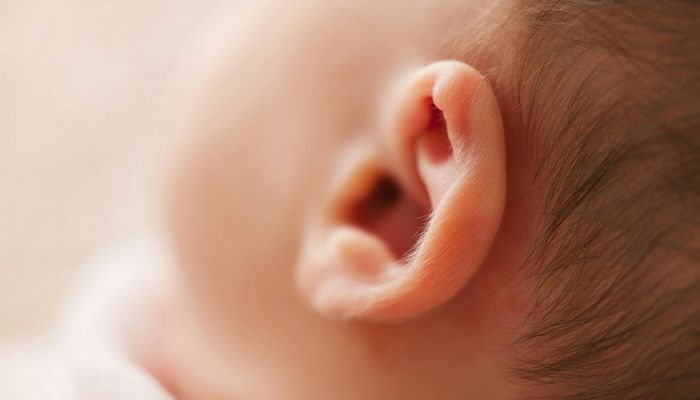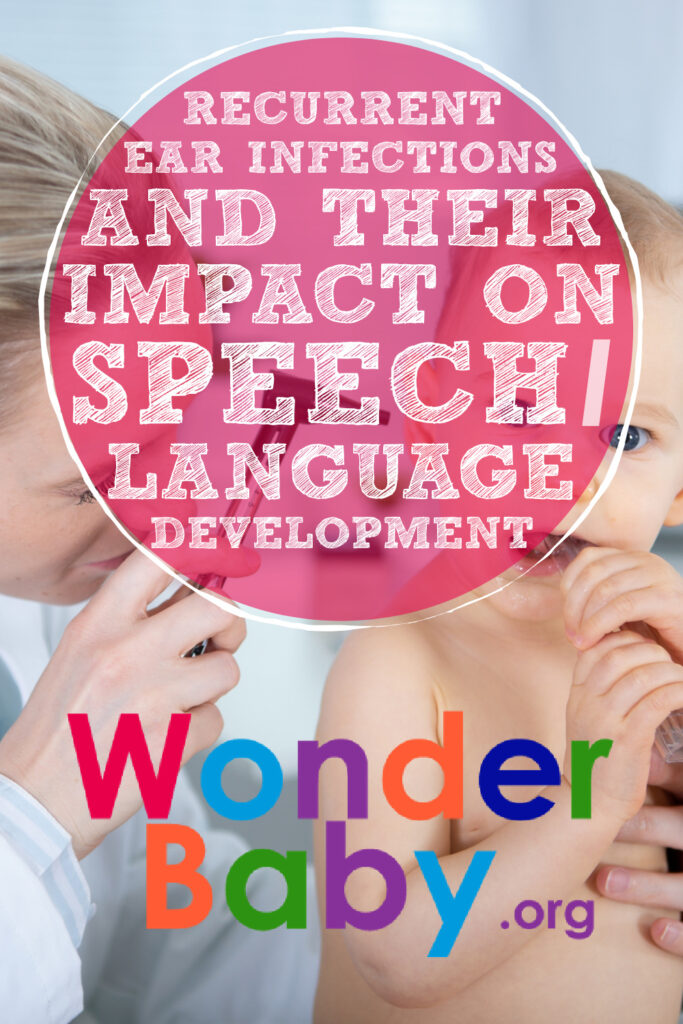Recurrent Ear Infections and Their Impact on Speech/Language Development

- Structures in the middle and inner ear play an important role in the brain’s ability to interpret sound.
- Increased fluid inside the ear affects how the brain learns and responds to sounds.
- The length and severity of your child’s recurrent ear infections may impact their likelihood of experiencing long-term consequences.
- Qualified health professionals can accurately diagnose a language delay or disorder.
- There are many ways to help your child if they experience hearing loss or a speech/language delay after recurrent ear infections.
“My baby has another ear infection? Didn’t she have one last month?”
Many parents have concerns about their little one’s hearing, especially its effect on speech and language development. Because so much in a child’s world revolves around the ability to perceive and return sound, parents can experience anxiety about anything that could cause potential hearing damage, especially when their little one has an illness like recurrent ear infections.
But do recurrent ear infections actually have a long-term impact on a child’s speech and language development?
Accumulated fluid or infection inside your child’s ears can impact their language acquisition skills. However, there are things you can do to help your child stay on track with their communication abilities.
Inside the Inner Ear

Experts from the National Institute on Deafness and Other Communication Disorders (NIDCD)11. How Do We Hear? National Institute of Deafness and Other Communication Disorders. 2022. https://www.nidcd.nih.gov/health/how-do-we-hear#:~:text=Sound%20waves%20enter%20the%20outer,malleus%2C%20incus%2C%20and%20stapes. explain that the eardrum moves in response to perceived sound waves and sends these vibrations to the structures of the middle ear. These “turn up the volume” of the sound vibrations and send it to the cochlea (the spiral-like structure) in the inner ear.
From there, the cochlea turns the sound vibrations into an electrical signal and sends it to the auditory nerve. The auditory nerve is connected to the brain, which then interprets the signal as either a new or recognized sound.
When you understand the delicate structures inside a child’s ear, it’s easier to see how increased fluid (or infected fluid) in the middle and inner ear can increase internal pressure on the sensitive ear drum.
How Recurrent Ear Infections Affect Language Development

The American Academy of Pediatrics22. Early Literacy. American Academy of Pediatrics. 2021. https://www.aap.org/en/patient-care/early-childhood/early-childhood-health-and-development/early-literacy/#:~:text=The%20first%203%20years%20of,from%20birth%20stimulates%20brain%20development. reports that the first three years of a child’s life are the most formative regarding speech and language development.
Coincidentally, this is the same period where your little one may be frequently ill with colds or other viral illnesses as their immune systems fight their first battles with a variety of germs.
Sometimes, these cold-like symptoms will turn into an ear infection.
Because the accumulated and/or infected fluid in the middle and inner ear muffles and distorts sound, language development can be negatively impacted if ear infections occur repeatedly in a short time frame.
Short-Term vs Long-Term Effects of Recurrent Infections

Managing your child’s discomfort during an ear infection can be difficult for many parents.
I have vivid memories of rocking my children in the middle of the night during their bouts with ear infections and ear pain. This would often lead to what I call the “2 a.m. special,” which consisted of me holding a little one and rocking away while my mind engaged in a frenzy of what could happen and how I would respond.
Sometimes, it doesn’t help to be a nurse.
As you work to soothe your child, you may (like me) think about possible aftereffects of this condition— now and in the future.
Immediate Impact
Do you notice that your baby is often tugging or pulling at their ears? How about tilting their head to the side? Or that aggressive face rubbing?
Among other developmental or physical causes33. Ear – Pulling At or Rubbing. Seattle Children’s Hospital. 2022. https://www.seattlechildrens.org/conditions/a-z/ear-pulling-at-or-rubbing, these may all be attempts to relieve or drain pressure from accumulated fluid in the middle ear.
You may think that any ear infection automatically requires treatment with antibiotics. However, many medical professionals, such as those at the Mayo Clinic44. Weiss, C.. Mayo Clinic Q and a: Understanding ear infections. Mayo Clinic. 2023. https://newsnetwork.mayoclinic.org/discussion/mayo-clinic-q-and-a-understanding-ear-infections/#:~:text=For%20many%20kids%2C%20it%20is,of%20less%20than%20102.2%20F., report that a “wait and see” approach may be best.
The primary goal at this stage is managing your child’s discomfort through the use of home remedies55. Home Remedies for an Ear Infection: What To Try and What To Avoid. Cleveland Clinic. 2024. https://health.clevelandclinic.org/home-remedies-for-ear-infection, giving over-the-counter pain medication to ease discomfort, and monitoring for worsening signs66. Alter, N., & Ostrower, S.. Ear Infections in Children: Information for Parents. HealthyChildren.org. 2023. https://www.healthychildren.org/English/health-issues/conditions/ear-nose-throat/Pages/Ear-Infection-Information.aspx in your child’s condition.
Potential Long-Term Consequences
Chronic hearing loss and long-term damage from recurrent or untreated ear infections are rare, but it does happen.
Healthcare professionals from Penn Medicine77. Chronic Ear Infection. Pennmedicine.org. 2023. https://www.pennmedicine.org/for-patients-and-visitors/patient-information/conditions-treated-a-to-z/chronic-ear-infection#:~:text=Possible%20Complications,after%20ear%20tubes%20are%20inserted describe other possible chronic complications, such as:
- Infection of the bone behind the ear (mastoiditis)
- Persistent drainage from a hole in the eardrum that isn’t healing (may also happen after ear tubes are placed)
- Cyst in the middle ear (cholesteatoma)
- Hardening or stiffening of the tissue in the middle ear (tympanosclerosis)
- Erosion or damage to the bony structures of the middle ear
- Facial paralysis
- Inflammation or infection around the brain or in the brain
- Damage to the bony structures inside the ear that affect balance
Generally speaking, the amount and duration of ear infections experienced by your child will increase their chances of permanent hearing loss or experiencing other long-term effects.
How to Identify Language Delays Due to Ear Infections

Because parents and other consistent caregivers spend a significant amount of time interacting with their children, these individuals are well-positioned to notice trends and concerning pieces in their child’s development.
Experts from the American-Speech-Language-Hearing Association (ASHA)88. Early Identification of Speech, Language, Swallowing, and Hearing Disorders. American Speech-Language-Hearing Association. https://www.asha.org/public/early-identification-of-speech-language-and-hearing-disorders/ describe the following signs that may indicate a language disorder in your child:
| Age | Noted sign |
| Birth to 3 months | Not smiling or playing with others |
| 4 to 7 months | No babbling or other sounds |
| 7 to 12 months | Limited number of soundsNo use of hand gestures (e.g. pointing) |
| 7 months to 2 years | Does not appear to understand what others say (e.g. following commands like “Give that to me.”) |
| 12 to 18 months | Speaks only a few words |
| 18 months to 2 years | Not able to put two words together |
| 2 years | Says less than 50 words |
| 2 to 3 years | Has trouble talking with or playing with other children |
| 2 ½ to 3 years | Struggles with early reading and writing skills (e.g. may not know how to scribble or look at books.) |
It’s important to remember that each child develops at their own pace: Some may achieve these milestones earlier, while others take a little longer.
If you feel your child is experiencing a significant delay or have concerns about a language delay or disorder, contact a qualified healthcare professional with your concerns.
Intervention and Management Strategies

What can be done to help children with recurrent ear infections and prevent future infections from occurring?
Medical Management
In many cases, your child’s doctor may recommend a referral to an otorhinolaryngologist (ENT- ears, nose, and throat) doctor if your child continues to experience frequent ear infections. These specialists can provide a range of therapies to help prevent future infections, including surgery if indicated.
If your child has recurrent ear infections, there are a variety of medical treatments and procedures99. McDonald, K. R.. Recurrent Ear, Throat, and Sinus Infections In Pediatrics: Signs, Causes, and Treatment. Houston Ear Nose Throat & Allergy. 2023. https://www.houstonent.com/blog/recurrent-ear-throat-and-sinus-infections-in-pediatrics-signs-causes-and-treatment available to manage this condition.
Collaborate with your child’s physician and ENT specialist to determine which procedures may be most appropriate for your child’s needs.
Audiology
An audiologist1010. What Is an Audiologist. American Academy of Audiology. https://www.audiology.org/consumers-and-patients/what-is-an-audiologist/ (doctor specializing in hearing, balance, and ear problems) may work with your child’s doctor or ENT to determine the type and severity of hearing loss, as well as work with these professionals to determine treatment.
As the Mayo Clinic College of Medicine and Science1111. Audiologist. Mayo Clinic College of Medicine and Science. https://college.mayo.edu/academics/explore-health-care-careers/careers-a-z/audiologist/#:~:text=Audiologists%20are%20health%20care%20professionals,develop%20a%20plan%20for%20treatment. states, “Audiologists specialize in hearing aids, inner ear implants, and assistive listening devices.”
If your child has hearing deficits due to recurrent ear infections, these specialists may be able to provide practical solutions to augment whatever hearing abilities your child has.
Speech and Language Therapy
The American Academy of Otolaryngology- Head and Neck Surgery1212. Speech and Language Development. ENT Health. https://www.enthealth.org/be_ent_smart/speech-and-language-development/ reports that delays in a child’s speech or language caused by a buildup of fluid in the middle or inner ear often go away on their own after the fluid problem is corrected.
In other cases, these problems may persist.
Speech and/or language therapy may be suggested by your child’s doctor, teacher, or other interventionist to help your child learn or correct speech difficulties resulting from hearing loss or complications of recurrent ear infections.
These individuals will carefully assess your child’s speech patterns, as well as determine difficulties in expressive and/or receptive language abilities, and work with your family to determine the most appropriate course of action for your child.
Home Strategies to Support Language Development
Infancy and early childhood are prime times for language acquisition and the ability to exchange communication with other individuals.
To support your little one in their language development skills1313. Activities to Encourage Speech and Language Development. American Speech-Language-Hearing Association. https://www.asha.org/public/speech/development/activities-to-encourage-speech-and-language-development/, consider activities such as:
- Make simple sounds like “ma,” “da,” and “ba,” and encourage your baby to try to make the sounds back to you. Exaggerated mouth movement helps very young children see the difference between sounds like “b” and “d” and usually results in a few giggles from your little one.
- Pretend you’re having a conversation with your child. Model skills like eye contact, taking turns speaking, repeating words or sounds back to each other, and reflecting intonation and pitch.
- Count what you see. “Do you see the fish? How many are there? Let’s count— one, two, three…”
- Use hand gestures like waving and pointing.
- Talk about animal sounds. By making statements such as “The kitty says meow-meow,” your child learns to connect the sound with the animal.
Simply talking to (and when they’re old enough, with) your child does a great deal to help them learn speech and language patterns.
Consistently spending time with your child and sharing observations and experiences from the world around you helps you learn about each other, practice new communication skills, and strengthen the bond between you and your child.
While speech or language delays following recurrent ear infections are relatively rare, they can happen. By being aware of potential signs that your little one is struggling in these areas, you can silence the “2 a.m. special” by knowing that many different forms of help are available to you and your child to manage these difficulties.
References
- How Do We Hear? National Institute of Deafness and Other Communication Disorders. (2022, March 16). https://www.nidcd.nih.gov/health/how-do-we-hear#:~:text=Sound%20waves%20enter%20the%20outer,malleus%2C%20incus%2C%20and%20stapes.
- Early Literacy. American Academy of Pediatrics. (2021, December 21). https://www.aap.org/en/patient-care/early-childhood/early-childhood-health-and-development/early-literacy/#:~:text=The%20first%203%20years%20of,from%20birth%20stimulates%20brain%20development.
- Ear – Pulling At or Rubbing. Seattle Children’s Hospital. (2022, December 30). https://www.seattlechildrens.org/conditions/a-z/ear-pulling-at-or-rubbing
- Weiss, C. (2023, January 23). Mayo Clinic Q and a: Understanding ear infections. Mayo Clinic. https://newsnetwork.mayoclinic.org/discussion/mayo-clinic-q-and-a-understanding-ear-infections/#:~:text=For%20many%20kids%2C%20it%20is,of%20less%20than%20102.2%20F.
- Home Remedies for an Ear Infection: What To Try and What To Avoid. Cleveland Clinic. (2024, March 28). https://health.clevelandclinic.org/home-remedies-for-ear-infection
- Alter, N., & Ostrower, S. (2023, October 13). Ear Infections in Children: Information for Parents. HealthyChildren.org. https://www.healthychildren.org/English/health-issues/conditions/ear-nose-throat/Pages/Ear-Infection-Information.aspx
- Chronic Ear Infection. Pennmedicine.org. (2023, January 24). https://www.pennmedicine.org/for-patients-and-visitors/patient-information/conditions-treated-a-to-z/chronic-ear-infection#:~:text=Possible%20Complications,after%20ear%20tubes%20are%20inserted
- Early Identification of Speech, Language, Swallowing, and Hearing Disorders. American Speech-Language-Hearing Association. (n.d.). https://www.asha.org/public/early-identification-of-speech-language-and-hearing-disorders/
- McDonald, K. R. (2023, January 10). Recurrent Ear, Throat, and Sinus Infections In Pediatrics: Signs, Causes, and Treatment. Houston Ear Nose Throat & Allergy. https://www.houstonent.com/blog/recurrent-ear-throat-and-sinus-infections-in-pediatrics-signs-causes-and-treatment
- What Is an Audiologist. American Academy of Audiology. (n.d.). https://www.audiology.org/consumers-and-patients/what-is-an-audiologist/
- Audiologist. Mayo Clinic College of Medicine and Science. (n.d.). https://college.mayo.edu/academics/explore-health-care-careers/careers-a-z/audiologist/#:~:text=Audiologists%20are%20health%20care%20professionals,develop%20a%20plan%20for%20treatment.
- Speech and Language Development. ENT Health. (n.d.). https://www.enthealth.org/be_ent_smart/speech-and-language-development/
- Activities to Encourage Speech and Language Development. American Speech-Language-Hearing Association. (n.d.). https://www.asha.org/public/speech/development/activities-to-encourage-speech-and-language-development/

The information WonderBaby provides is not intended to be, and does not constitute, medical or other health advice or diagnosis and should not be used as such. Always consult with a qualified medical professional about your specific circumstances.
Related Posts

Eye Conditions and Syndromes, Visual Impairment
Neuralink Announces Plans to Restore Sight to the Blind with Brain Chip
Elon Musk’s company Neuralink has announced plans to begin human trials of its new “Blindsight” brain chip by the end of 2025.

Health & Nutrition
Can Baby Skin Care Products Expire?
Is that forgotten tube of diaper rash cream still safe to use? Learn more about the expiration dates of popular skin care products for infants.

Health & Nutrition
Boosting Immunity in Kids: 3 Tips for a Healthy Winter
Parents can help boost their kids’ immunity during cold and flu season by maintaining healthy eating, sleeping, and exercising habits in the winter.